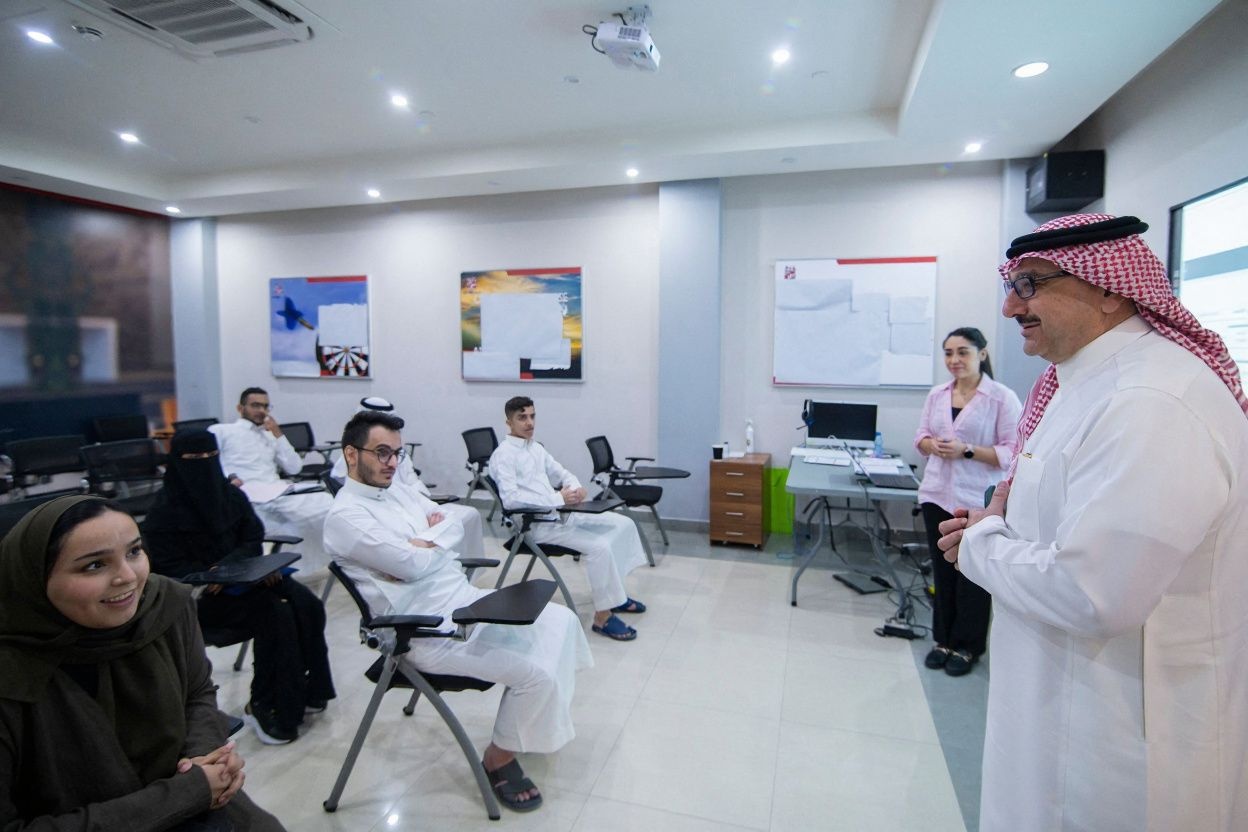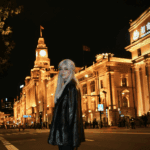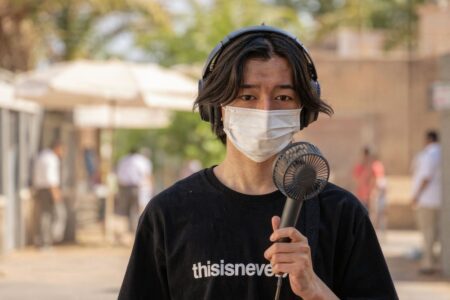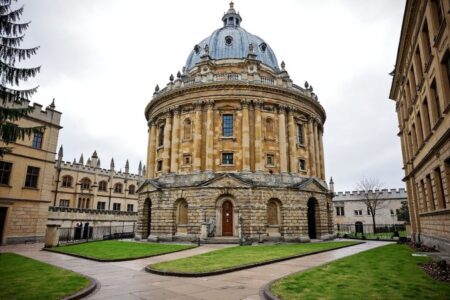
Studying in Saudi Arabia may not be the most popular option for an international student, but it’s time to take a closer look.
The largest country on the Arabian Peninsula, wealthiest in the Arab world, and home to Mecca, Islam’s holiest city, is where universities are making global headlines by climbing the ranks of top academic institutions.
 Saudi Arabia is one of the most literate countries in the world, with a 98% literacy rate.
Saudi Arabia is one of the most literate countries in the world, with a 98% literacy rate.
Are Saudi Arabian universities good?
The answer is sort of.
Twenty Saudi Arabian universities are part of the QS World University Ranking 2025, with three within the top 200.
The nation also claims 24 of the top 100 universities in the Arab region, according to the QS Arab Region University Rankings 2025, with King Fahd University of Petroleum and Minerals (KFUPM) and King Saud University claiming first and third respectively.
If you’re looking to study petroleum engineering, Saudi Arabia is probably the #1 place to be.
With the importance of the energy and oil sector to the country, universities here are well-known for their oil and gas engineering programmes. KFUPM is a testament to this as they are ranked #2 on QS World University Rankings by subject for petroleum engineering.
Costs
Saudi Arabia conjures the picture of an extravagant country. With towering skyscrapers and glitzy malls, it’s no surprise that many think an education here would be costly.
However, when it comes to studying in Saudi Arabia, tuition costs can be fairly affordable compared to other destinations.
A bachelor’s programme can cost about US$2,663 to US$26,631 annually, while master’s programmes cost between US$5,859 to US$53,263.
Interestingly, you can only be between 18 and 25 to enrol in a bachelor’s programme in the country — anyone younger or older will be rejected.
English-taught courses are available at undergraduate and graduate levels, though they are more common in master’s programmes.
Internships and opportunities for international students
Like other universities worldwide, internships, placements, and field trips are available for international students attending Saudi universities.
King Abdullah University of Science and Technology (KAUST) even announced that they’d be providing international students with three to six months of paid internships. The internships offer:
- Fully funded tuition fees by the university
- Housing: A bedroom with a private bathroom
- A monthly stipend of US$1,000 for international students
- Roundtrip airfare
- Health insurance
Disclaimer: if you plan on studying in Saudi Arabia, you should note that while international students are generally accepted into Saudi universities, admission for female students may be limited or restricted, especially for lesser-known universities.

If you’re considering studying in Saudi Arabia, this list will help you get started. Source: King Abdulaziz University Facebook
5 universities to consider if you’re planning on studying in Saudi Arabia
1. King Abdulaziz University
Founded in 1967 and located in south Jeddah, King Abdulaziz University (KAU) is a private university aiming to spread higher education in the western region of Saudi Arabia. The university ranks #149 in the QS World University Rankings 2025 and #24 for Pharmacy on the QS World University Ranking by Subject 2025.
It is the largest university in the country and the centre of teaching and research in Jeddah. It comprises 24 faculties, including Marine Sciences, Geology, Nuclear Engineering, Medical Engineering, Meteorology, Aviation, and Mineralogy.
2. Arab Open University
Located in Riyadh, the capital city of Saudi Arabia, Arab Open University (AOU) is a partner institution of the Open University (OU), UK. To date, more than 48,000 students have graduated from AOU with an OU award, with 56% of the conferred students being women.
Here, four faculties make up the school: Business Studies, Computer Studies, Language Studies, and Applied College. The school welcomes students from over 120 different nationalities and is one of the most inclusive ones in the country, having launched programmes for the deaf and hard of hearing in the Arab world.
View this post on Instagram
3. King Saud University
Ranked #1 among Saudi universities, King Saud University is the oldest established university in the Kingdom of Saudi Arabia. It ranks #90 in the Shangai Ranking 2024 Academic Ranking of World Universities list, and you’ll find that 23% of academic research published in Saudi Arabia came from the university.
The school has over 2,200 international students representing over 90 nationalities. Here, they pursue their studies across its multiple colleges in the fields of science, community, health, and humanities.
4. Taif University
Nestled in Al Hawiyah, Ta’if, Taif University offers a range of undergraduate and graduate programmes in fields such as science, engineering, humanities, and health sciences. The university even has a College of Sharia and Law for those interested in pursuing the topic.
Taif University currently has over 923 international students, with 92% as undergraduate and 8% post-graduate students.
5. King Fahd University of Petroleum and Minerals
Established in 1963, the King Fahd University of Petroleum and Minerals is known for its strong academics in the sciences. The university has been ranked #2 in petroleum engineering and #58 in data science and AI in the QS World University Rankings by Subject 2025.
With just a 4% student acceptance rate, this university is undoubtedly where the finest students can seek like-minded individuals. Here, you’ll find seven colleges — in engineering and physics, computing and mathematics, petroleum engineering and geosciences, chemicals and materials, design and built environment, business, and general sciences.
What to know before committing to studying in Saudi Arabia
 Studying in Saudi Arabia means being close to the holy city of Mecca, where you might witness the hundreds of thousands of pilgrims visiting every year. Safety is a top concern for any international student.
Studying in Saudi Arabia means being close to the holy city of Mecca, where you might witness the hundreds of thousands of pilgrims visiting every year. Safety is a top concern for any international student.
Saudi Arabia scores 0.093 on the Safety Perfection Index (SPI), according to FDI Intelligence, just 0.005 points behind Norway. This places the country among the safest nations, thanks to its low rates of violent crime, severe weather incidents, and mental health risks.
A Quora user agrees, “Saudi Arabia as a whole is ranked the safest country among the G20 countries—safer than the US, the UK, France, China and Russia. You can live life without ever having to worry about your safety. You can even leave your house unlocked, it is that safe!”
While petty crime may be low, there are some important factors to keep in mind:
Cultural differences and laws
Saudi Arabia is a deeply conservative Islamic nation with strict laws based on Sharia principles. As a visitor or someone studying in the country, it’s crucial to respect local customs and legal expectations. For example, public displays of affection and alcohol consumption are prohibited, with penalties for violations.
Women still face certain restrictions, such as dress codes, though these have been gradually relaxed.
The traditional attire in Saudi Arabia consists of the thobe for men and the abaya for women. Along with the abaya, many Saudi women also wear a headscarf and sometimes a face veil as part of their cultural and religious practice.
It’s advised to wear loose-fitting clothes that cover as much skin as possible. Here’s what you could wear:
- Wear flowy or oversized clothing to keep cool from the heat while staying modest.
- Wear T-shirts reaching the elbow.
- Wear long, baggy tops, trousers, or loose skirts and dresses that reach to the ankle.
- For women, wear clothing with high necklines.
LGBT+ Community
Same-sex relationships are illegal in Saudi Arabia, though prosecutions are rare.
All couples, regardless of sexual orientation, should avoid public displays of affection. Transgender individuals may also encounter challenges, particularly with dress codes and healthcare access. Despite these challenges, Saudi Arabia maintains that visitors’ privacy will be respected.
Studying in Saudi Arabia as a woman
Women’s rights in Saudi Arabia have been historically limited, but progress is being made.
Today, women are allowed to attend university without needing the permission of their male counterparts. However, females and males are still segregated on campus.
Founded in 2010, Princess Nourah bint Abdulrahman University is a prime example of Saudi Arabia’s commitment to advancing women’s education.
The university is the first women’s college in Saudi Arabia and has 36,800 students — the world’s largest all-women’s campus – to provide female students better access to male-dominated fields, like medicine, computer science, management, engineering, and management.
Since the changes, the enrollment rate has surpassed that of men. Statistics revealed by the Ministry of Education found that more Saudi women are studying in universities than men, Alarabiya News reports.










